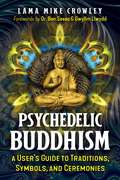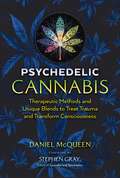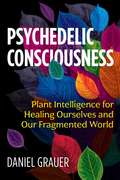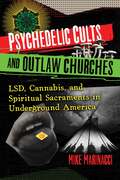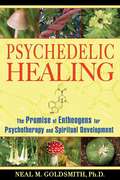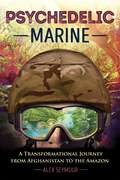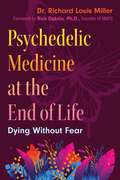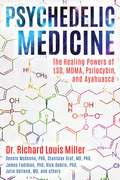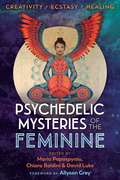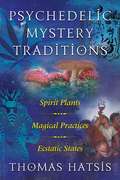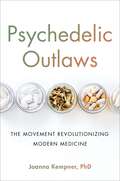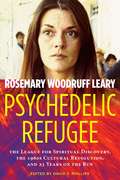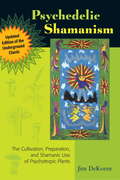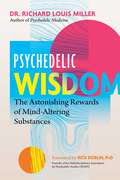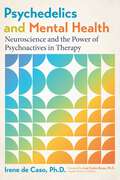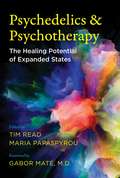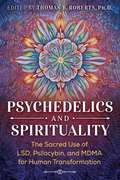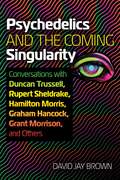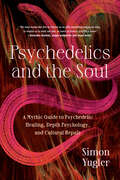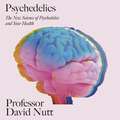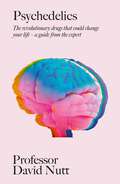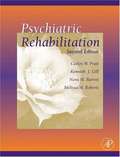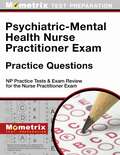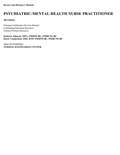- Table View
- List View
Psychedelic Buddhism: A User's Guide to Traditions, Symbols, and Ceremonies
by Lama Mike CrowleyA guide to psychedelics and Buddhist practice• Presents guidance and techniques for Buddhists who wish to incorporate psychedelics into their practice as well as for psychonauts who are interested in the maps of inner space provided by Buddhism• Explores the use of psychedelics in Buddhist practice, sharing the kind of spiritual experiences that can be gained with each• Describes meditation techniques, with special attention being given to the generation of the Four Positive AttitudesIn this user&’s guide to psychedelic Buddhism, Lama Mike Crowley presents techniques for Buddhists who wish to incorporate psychedelics into their practice as well as for psychonauts who are interested in the maps of inner space provided by Buddhism. The author details how psychedelics have led to spontaneous awakening experiences, such as &“Indra&’s net&” and universal voidness, that were once thought to be available only to advanced meditators. He explores the use of psychedelics, such as LSD and psilocybin mushrooms, in a Buddhist context, sharing the kind of spiritual experiences and benefits that can be gained with each. The author also looks at the use of psychedelics encoded in Vedic and Buddhist scriptures, particularly in the Vajrayāna tradition, from the Middle Ages until the present day. Presenting an informed summary of Buddhism for psychonauts, the author explores the key beliefs of Buddhism, the life of the Buddha, and the practices followed in various yānas, or paths. He describes meditation techniques, with special attention being given to the generation of the Four Positive Attitudes: loving-kindness, compassion, sympathetic joy, and equanimity, each being taken from their personal to their universal forms. He looks at Buddhist symbols, ceremonies, deities, and initiations, as well as psychic powers in Buddhist tradition, and how these ideas and practices can be used in the exploration of the inner realms of consciousness.Providing a complete guide to integrating psychedelics into Buddhist practice, this book reveals how the ancient Buddhist teachers discovered their universal maps of consciousness and how you can use their wisdom to guide your journey.
Psychedelic Cannabis: Therapeutic Methods and Unique Blends to Treat Trauma and Transform Consciousness
by Daniel McQueen• Explains how cannabis can be used to treat trauma and emotional pain, as a profound problem-solving tool, and as a potent catalyst for self-transformation and ongoing healing work • Shares methods to minimize the unwanted effects, such as intensified anxiety and paranoia, and direct the experience to produce deep physical relaxation and, when needed, elevated healing states • Details how to blend cannabis strains for specific kinds of psychedelic experiences and how to prepare for your sessions to ensure success Despite the recent resurgence of interest in the therapeutic potential of psychedelics, Cannabis sativa as a psychedelic therapy has been completely overlooked. Yet, as psychedelic specialist Daniel McQueen reveals, when used skillfully and with intention, cannabis can be used to treat trauma and other mental health concerns just as psilocybin mushrooms and MDMA can. It can also be used as a problem-solving tool and as a potent catalyst for self-actualization and ongoing healing work. Presenting a step-by-step guide, McQueen explores how to transform cannabis into a reliable and safe psychedelic medicine. Drawing on his years of experience working with clients to release traumas and emotional pain and step into their full potential, he explains the importance of proper dose, set, setting, and intention and details how to prepare for your psychedelic cannabis sessions to ensure success. He shares methods to use cannabis in a specialized and mindful way to minimize unwanted effects, such as intensified anxiety and paranoia, and direct the experience to produce vivid psychedelic states, deep physical relaxation, and healing. Looking at the unique qualities of di erent cannabis strains, the author explores the art of making a psychedelic cannabis blend, the possibilities and hidden potentials of each strain, and how to blend strains for specific medicine experiences, ranging in similarity to MDMA, psilocybin, and even ayahuasca. Unveiling new depth to this ancient spiritual and medicinal ally, McQueen shows how consciously using cannabis as a psychedelic can help transform your trauma into resilience and shift your mindset from surviving to thriving.
Psychedelic Consciousness: Plant Intelligence for Healing Ourselves and Our Fragmented World
by Daniel GrauerAn examination of the use of psychedelics for understanding ourselves, connecting with the world around us, and enacting outer change through inner transformation • Explores sacred tools and technologies to help us reestablish a lost ideology of unity, with a specific focus on natural plant/fungi psychedelics • Looks at the history of psychedelics and their role in facilitating natural intelligence&’s ability to increase itself through ongoing analysis of its own experience • Provides guidelines for safely using natural plant/fungi psychedelics and integrating them into society to access unified consciousness and restore balance to our world Our ecological, social, and political issues all stem from the ideologies that drive our collective actions. In contrast to our innate humanity, which is rooted in unity, these ideologies have led us to believe that we are separate from each other, separate from nature, and separate from the results of our actions. Such a worldview encourages individuals to maximize self-interest, which then causes fragmentation, conflict, pollution, and the depletion of natural resources. Offering practical steps that we can take to heal ourselves and our fragmented world, author Daniel Grauer explores the use of sacred tools and technologies, such as natural psychedelics, meditation, and yoga, in order to reestablish an ideology of unity, work in symbiotic harmony with the Earth, and restore our world as a sustainable and prosperous whole. Grauer explains how individuals--and by extension societies--benefit from safely accessing transcendent states of consciousness, such as those provided by psychedelics. He explores how psychoactive substances have been used throughout history all over the world for healing, personal growth, spiritual development, and revealing hidden truths, such as in the Eleusinian Mysteries, Soma practices in Vedic India, and rituals in several South American indigenous cultures. Drawing on the plant intelligence work of Paul Stamets and Stephen Buhner, Grauer shows that the growth of individual and collective intelligence is hindered by the prohibition of psychedelics, which naturally foster humanity&’s capacity for analysis, innovation, and cooperation. In addition to creating a sense of unity with all things, psychedelics offer the mind a new perspective from which to analyze its experience and heighten its awareness. Drawing on his own experience and research, Grauer provides guidelines for how to safely use natural plant/fungi psychedelics in order to access the unified consciousness of our ancestors and induce the states of awareness we need to restore natural harmony to our world.
Psychedelic Cults and Outlaw Churches: LSD, Cannabis, and Spiritual Sacraments in Underground America
by Mike MarinacciA comprehensive tour of North American spiritual groups that use psychoactive drugs in the search for higher consciousness• Explores prominent psychedelic churches and sects in depth, including the Native American Church and their peyote rituals, the cannabis-sex temple known as the Psychedelic Venus Church, and the Church of Naturalism, an LSD-therapy cult that came to a murderous end• Presents an encyclopedic survey of dozens of minor organizations—many of which have never before been documented in an authoritative source• Shares personal interviews and anecdotes about the strange, outrageous adventures of religious psychonauts, alongside rare photos and illustrationsFrom LSD-powered guru Timothy Leary to cannabis sex cults to psychedelic outlaw churches, Mike Marinacci presents a comprehensive tour of North American religious sects and spiritual groups who use entheogens and psychoactive drugs in the search for higher consciousness, mystical insight, and spiritual enlightenment. Exploring prominent churches and cults in depth, he examines the lives of their colorful leaders, the origins of their unorthodox beliefs, the controversial practices of their congregants, and their many conflicts with both law enforcement and public opinion. He looks at the Native American Church and their legal battle over their peyote rituals, the cannabis sex temple known as the Psychedelic Venus Church, the murderous end of the LSD-therapy cult known as the Church of Naturalism, and several other major groups and temples of psychedelic spirituality. He then offers an encyclopedic survey of dozens of minor organizations, many of which have never before been documented in an authoritative source. Sharing personal interviews and anecdotes about the strange outrageous adventures of religious psychonauts alongside rare photos and illustrations, this extensively researched study of underground psychedelic religious sects in the United States reveals their spiritual and cultural influence from the 1960s to the present day.
Psychedelic Healing: The Promise of Entheogens for Psychotherapy and Spiritual Development
by Neal M. GoldsmithPsychedelics as therapeutic catalysts for emotional and spiritual transformation • Explores the latest medical research on the healing powers of entheogens • Reveals the crucial role of tribal and shamanic wisdom in psychedelic medicine • Provides guidelines for working with psychedelics, including the author’s personal healing and recommendations for creating change on the spiritual and societal levels Banned after promising research in the 1940s, ’50s, and ’60s, the use of psychedelics as therapeutic catalysts is now being rediscovered at prestigious medical schools, such as Harvard, Johns Hopkins, NYU, and UCLA. Through clinical trials to assess their use, entheogens have been found to ease anxiety in the dying, interrupt the hold of addictive drugs, cure post-traumatic stress disorder, and treat other deep-seated emotional disturbances. To date, results have been positive, and the idea of psychedelics as powerful psychiatric--and spiritual--medicines is now beginning to be accepted by the medical community. Exploring the latest cutting-edge research on psychedelics, along with their use in indigenous cultures throughout history for rites of passage and shamanic rituals, Neal Goldsmith reveals that the curative effect of entheogens comes not from a chemical effect on the body but rather by triggering a peak or spiritual experience. He provides guidelines for working with entheogens, groundbreaking analyses of the concept--and the process--of change in psychotherapy, and, ultimately, his own story of psychedelic healing. Examining the tribal roots of this knowledge, Goldsmith shows that by combining ancient wisdom and modern research, we can unlock the emotional, mental, and spiritual healing powers of these unique and powerful tools, providing an integral medicine for postmodern society.
Psychedelic Marine: A Transformational Journey from Afghanistan to the Amazon
by Alex SeymourA vivid portrait of both the traumas of war and the shamanic healing ceremonies of ayahuasca• Explains how our culture lacks rites of passage and how shamanic ritual can fill this gap• Reveals how ayahuasca frees your consciousness from inherited beliefs, fears, and traumatic experience, allowing healing from PTSD, alcoholism, and addiction• Details the author’s experiences in Afghanistan, sailing on the Amazon river with a shaman, and the many ayahuasca ceremonies he experienced in the jungleAfter returning from a tour of duty during the war in Afghanistan, Alex Seymour needed a way to cope with the extremes he experienced as a member of the Royal Marine Commandos, losing 7 men in his unit, and having his best friend critically injured by a Taliban bomb. Drawing upon his pre-deployment experiences with DMT and psilocybin mushrooms, Alex knew that entheogens could help him release his fears and traumas. But he also knew that simply taking psychedelics wasn’t enough--he needed ceremony, something sacred to draw meaning from his experiences, to help him reassess not only the war and his role in it, but his entire life. So he set out for the Amazon in search of the hallucinogenic brew known as ayahuasca and a shaman to guide him. The result is a crazy, page-turning adventure where he journeys deep into the jungle and himself.Alex soon finds himself deep within the jungle on an incredible adventure, sailing on the Amazon river with an ayahuasca shaman and his troop of 8 female shamanas, whose ethereal songs help guide participants during the nightly ayahuasca ceremonies. Accompanied by others seeking wisdom and a redemptive experience from their First World professional lives, Alex finds his core beliefs fundamentally challenged, replaced by the power of direct experience of the sacred, which allows him to release his fears from the war and set an inspiring path for the future.Painting a vivid portrait of both the anguish of war and the transcendent world of shamanic ritual, the author shows how young people often enlist in the military to satisfy our human need for a rite of passage into adulthood, a ritual sorely missing in our culture. He explores how ayahuasca can offer a way to help soldiers prepare for war and help combat veterans heal from war and overcome PTSD--as well as alcoholism and addiction. From Afghanistan to the Amazon, the author shows how ayahuasca frees your consciousness from inherited beliefs and fears, offering a truly transformative rite of passage.
Psychedelic Medicine at the End of Life: Dying without Fear
by Dr. Richard Louis Miller• Outlines 10 steps for dying gracefully with the help of psychedelics, including how to navigate the complex legal landscape and find the right guide and therapy• Looks at clinical studies of psychedelics from UCLA, Johns Hopkins, and NYU School of Medicine that show dramatic lessening of end-of-life anxiety in terminally ill patients• Shares wisdom from experts on psychedelic research and palliative care, including Roland Griffiths, Katherine MacLean, Ira Byock, and Anthony BossisExamining the evolving landscape that is found around end-of-life psychedelic care, Dr. Richard Louis Miller, a clinical psychologist for more than half a century, looks at how LSD, MDMA, psilocybin, and ayahuasca can be vital tools in allowing individuals in all stages of life to confront fears of dying and, in so doing, lead richer lives.Miller shares wisdom from experts on the frontiers of psychedelic research and palliative care—including Roland Griffiths, Katherine MacLean, Ira Byock, and Anthony Bossis—and examines cutting-edge studies from Johns Hopkins, UCLA, and NYU School of Medicine that show dramatically decreased anxiety in terminally ill patients through the use of psychedelics. He explores how different substances can help the dying overcome their end-of-life distress. He also provides testimony from researchers and patients participating in psychedelic-assisted psychotherapy that helps convey the experience of ego death at the heart of the psychedelic experience.Miller outlines 10 steps for dying gracefully, without fear, with the help of psychedelics. He examines how to navigate the complex legal landscape and find the right guide, dose, and therapy. He also includes reflections from key figures in the psychedelic community as well as some of his own psychedelically informed mystical and near-death experiences.Revealing psychedelics as a portal of transformation, Miller shows how they are singularly valuable in helping individuals face the end of life with courage and serenity.
Psychedelic Medicine: The Healing Powers of LSD, MDMA, Psilocybin, and Ayahuasca
by Dr Richard Louis MillerExplores the potential of psychedelics as medicine and the intersections of politics, science, and psychedelics • Explores the tumultuous history of psychedelic research, the efforts to restore psychedelic therapies, and the links between psychiatric drugs and mental illness • Offers non-technical summaries of the most recent, double-blind, placebo-controlled studies with MDMA, psilocybin, LSD, and ayahuasca • Includes the work of Rick Doblin, Stanislav Grof, James Fadiman, Julie Holland, Dennis McKenna, David Nichols, Charles Grob, Phil Wolfson, Michael and Annie Mithoefer, Roland Griffiths, Katherine MacLean, and Robert Whitaker Embracing the revival of psychedelic research and the discovery of new therapeutic uses, clinical psychologist Dr. Richard Louis Miller discusses what is happening today in psychedelic medicine--and what will happen in the future--with top researchers and thinkers in this field, including Rick Doblin, Stanislav Grof, James Fadiman, Julie Holland, Dennis McKenna, David Nichols, Charles Grob, Phil Wolfson, Michael and Annie Mithoefer, Roland Griffiths, Katherine MacLean, and Robert Whitaker. Dr. Miller and his contributors cover the tumultuous history of early psychedelic research brought to a halt 50 years ago by the U.S. government as well as offering non-technical summaries of the most recent studies with MDMA, psilocybin, LSD, and ayahuasca. They explore the biochemistry of consciousness and the use of psychedelics for self-discovery and healing. They discuss the use of psilocybin for releasing fear in the terminally ill and the potential for MDMA-assisted psychotherapy in the treatment of PTSD. They examine Dr. Charles Grob’s research on the indigenous use and therapeutic properties of ayahuasca and Dr. Gabor Mate’s attempt to transport this plant medicine to a clinical setting with the help of Canada’s Department of National Health. Dr. Miller and his contributors explore the ongoing efforts to restore psychedelic therapies to the health field, the growing threat of overmedication by the pharmaceutical industry, and the links between psychiatric drugs and mental illness. They also discuss the newly shifting political climate and the push for new research, offering hope for an end to the War on Drugs and a potential renaissance of research into psychedelic medicines around the world.
Psychedelic Mysteries of the Feminine: Creativity, Ecstasy, and Healing
by David Luke Allyson Grey Maria Papaspyrou Chiara BaldiniAn exploration of the connections between feminine consciousness and altered states from ancient times to present day • Explores the feminine qualities of the psychedelic self, ancient female roots of shamanism, and how altered states naturally tap into the female archetype • Discusses feminist psychedelic activism, female ecstatics, goddess consciousness, the dark feminine, and embodied paths to ecstasy • Includes contributions by Martina Hoffmann, Amanda Sage, Carl Ruck, and others Women have been shamans since time immemorial, not only because women have innate intuitive gifts, but also because the female body is wired to more easily experience altered states, such as during the process of birth. Whether female or male, the altered states produced by psychedelics and ecstatic trance expand our minds to tap into and enhance our feminine states of consciousness as well as reconnect us to the web of life. In this book, we discover the transformative powers of feminine consciousness and altered states as revealed by contributors both female and male, including revered scholars, visionary artists, anthropologists, modern shamans, witches, psychotherapists, and policy makers. The book begins with a deep look at the archetypal dimensions of the feminine principle and how entheogens give us open access to these ancient archetypes, including goddess consciousness and the dark feminine. The contributors examine the female roots of shamanism, including the role of women in the ancient rites of Dionysus, the Eleusinian Sacrament, and Norse witchcraft. They explore psychedelic and embodied paths to ecstasy, such as trance dance, holotropic breathwork, and the similarities of giving birth and taking mind-altering drugs. Looking at the healing potential of the feminine and altered states, they discuss the power of plant medicines, including ayahuasca, and the recasting of the medicine-woman archetype for the modern world. They explore the feminine in the creative process and discuss feminist psychedelic activism, sounding the call for more female voices in the psychedelic research community. Sharing the power of “femtheogenic” wisdom to help us move beyond a patriarchal society, this book reveals how feminine consciousness, when intermingled with psychedelic knowledge, carries and imparts the essence of inclusivity, interconnectedness, and balance our world needs to heal and consciously evolve.
Psychedelic Mystery Traditions: Spirit Plants, Magical Practices, and Ecstatic States
by Stephen Gray Thomas HatsisA comprehensive look at the long tradition of psychedelic magic and religion in Western Civilization • Explores the use of psychedelics and entheogens from Neolithic times through Antiquity, the Middle Ages, and the Renaissance to the Victorian era and beyond • Reveals how psychedelics were integrated into pagan and Christian magical practices and demonstrates how one might employ a psychedelic agent for divination, sex magic, alchemy, communication with gods, and more • Examines the role of entheogens in the Mysteries of Eleusis in Greece, the worship of Isis in Egypt, the Dionysian mysteries, and the magical practices of the Thessalian witches as well as Jewish, Roman, and Gnostic traditions Unbeknownst--or unacknowledged--by many, there is a long tradition of psychedelic magic and religion in Western civilization. As Thomas Hatsis reveals, the discovery of the power of psychedelics and entheogens can be traced to the very first prehistoric expressions of human creativity, with a continuing lineage of psychedelic mystery traditions from antiquity through the Renaissance to the Victorian era and beyond. Describing how, when, and why different peoples in the Western world utilized sacred psychedelic plants, Hatsis examines the full range of magical and spiritual practices that include the ingestion of substances to achieve altered states. He discusses how psychedelics facilitated divinatory dream states for our ancient Neolithic ancestors and helped them find shamanic portals to the spirit world. Exploring the mystery religions that adopted psychedelics into their occult rites, he examines the role of entheogens in the Mysteries of Eleusis in Greece, the worship of Isis in Egypt, and the psychedelic wines and spirits that accompanied the Dionysian mysteries. The author investigates the magical mystery traditions of the Thessalian witches as well as Jewish, Roman, and Gnostic traditions. He reveals how psychedelics were integrated into pagan and Christian magical practices and demonstrates how one might employ a psychedelic agent for divination, magic, alchemy, or god and goddess invocation. He explores the use of psychedelics by Middle Eastern and medieval magicians and looks at the magical use of cannabis and opium from the Crusaders to Aleister Crowley. From ancient priestesses and Christian gnostics, to alchemists, wise-women, and Victorian magicians, Hatsis shows how psychedelic practices have been an integral part of the human experience since Neolithic times.
Psychedelic Outlaws: The Movement Revolutionizing Modern Medicine
by Joanna KempnerAn award-winning sociologist unearths how a group of ordinary people debilitated by excruciating pain developed their own medicine from home-grown psilocybin mushrooms—crafting near-clinical grade dosing protocols--and fought for recognition in a broken medical system. Cluster headache, a diagnosis sometimes referred to as a &‘suicide headache,&’ is widely considered the most severe pain disorder that humans experience. There is no cure, and little funding available for research into developing treatments. When Joanna Kempner met Bob Wold in 2012, she was introduced to a world beyond most people's comprehension—a clandestine network determined to find relief using magic mushrooms. These &‘Clusterbusters,&’ a group united only by the internet and a desire to survive, decided to do the research that medicine left unfinished. They produced their own psychedelic treatment protocols and managed to get academics at Harvard and Yale to test their results. Along the way, Kempner explores not only the fascinating history and exploding popularity of psychedelic science, but also a regulatory system so repressive that the sick are forced to find their own homegrown remedies, and corporate America and university professors stand to profit from their transgressions. From the windswept shores of the North Sea through the verdant jungle of Peruvian Amazon to a kitschy underground palace built in a missile silo in Kansas, Psychedelic Outlaws chronicles the rise of psychedelic medicine amid a healthcare system in turmoil. Kempner&’s gripping tale of community and resilience brings readers on a eye-opening journey through the politics of pain, through the stories of people desperate enough to defy the law for a moment of relief.
Psychedelic Refugee: The League for Spiritual Discovery, the 1960s Cultural Revolution, and 23 Years on the Run
by Rosemary Woodruff LearyA memoir by one of the original female psychedelic pioneers of the 1960s • Shares Rosemary&’s early experimentation with psychedelics in the 1950s, her development through the psychedelic revolution of the 1960s, and her involvement, at first exciting but then heartbreaking, with Dr. Timothy Leary • Describes her LSD trips with Leary, their time at the famous Millbrook estate, their experiences as fugitives abroad, including their captivity by the Black Panthers in Algeria, and Rosemary&’s years on the run after she and Timothy separated One of the original female psychedelic pioneers, Rosemary Woodruff Leary (1935-2002) began her psychedelic journey long before her relationship with Dr. Timothy Leary. In the 1950s, she moved to New York City where she became part of the city&’s most advanced music, art, and literary circles and expanded her consciousness with psilocybin mushrooms and peyote. In 1964 she met two former Harvard professors who were experimenting with LSD, Timothy Leary and Ralph Metzner, who invited her to join them at the Millbrook estate in upstate New York. Once at Millbrook, Rosemary went on to become the wife--and accomplice--of the man Richard Nixon called &“the most dangerous man in America.&” In this intimate memoir, Rosemary describes her LSD experiences and insights, her decades as a fugitive hiding both abroad and underground in America, and her encounters with many leaders of the cultural and psychedelic milieu of the 1960s. Compiled from Rosemary&’s own letters and autobiographical writings archived among her papers at the New York Public Library, the memoir details Rosemary&’s imprisonment for contempt of court, the Millbrook raid by G. Gordon Liddy, the tours with Timothy before his own arrest and imprisonment, and their time in exile following his sensational escape from a California prison. She describes their surreal and frightening captivity by the Black Panther Party in Algeria and their experiences as fugitives in Switzerland. She recounts her adventures and fears as a fugitive on five continents after her separation from Timothy in 1971. While most accounts of the psychedelic revolution of the 1960s have been told by men, with this memoir we can now experience these events from the perspective of a woman who was at the center of the seismic cultural changes of that time.
Psychedelic Shamanism, Updated Edition
by Jim DekornePsychedelic Shamanism presents the spiritual and shamanic properties of psychotropic plants and discusses how they can be used to understand the structure of human consciousness. Author Jim DeKorne offers authoritative information about the cultivation, processing, and correct dosages for various psychotropic plant substances including the belladonna alkaloids, d-lysergic acid amide, botanical analogues of LSD, mescaline, ayahuasca, DMT, and psilocybin. Opening with vivid descriptions of the author's personal experiences with psychedelic drugs, the book describes the parallels that exist among shamanic states of consciousness, the use of psychedelic catalysts, and the hidden structure of the human psyche. DeKorne suggests that psychedelic drugs allow us to examine the shamanic dimensions of reality. This worldview, he says, is ubiquitous across space, time, and culture, with individuals separated by race, distance, and culture routinely describing the same core reality that provides powerful evidence of the dimensional nature of consciousness itself. The book guides the reader through the imaginal realm underlying our awareness, a world in which spiritual entities exist to reconnect us with ourselves, humanity, and our planet. Accurate drawings of plants, including peyote, Salvia divinorum, and San Pedro, enhance the book's usefulness.From the Trade Paperback edition.
Psychedelic Wisdom: The Astonishing Rewards of Mind-Altering Substances
by Dr. Richard Louis Miller• Reveals how these scientists, doctors, therapists, and teachers have applied their entheogenic experiences in their professions, leading to therapeutic advancements, scientific discoveries, and healing for thousands • Includes contributions from scientific psychonaut Amanda Feilding, psychedelic swami Dr. Allan Ajaya, &“America&’s Doctor&” Dean Edell, convicted psychiatrist Frederike Meckel Fisher, love doctor Charley Wininger, professor of psychedelics Thomas B. Roberts, ethnobotanical explorer Dennis McKenna, the &“Sunshine Makers&” Tim Scully and Michael Randall, as well as many others Over the past decade, many famous entrepreneurs and celebrities have begun to open up about their life-changing experiences with psychedelics that led to their personal successes. But less well-known are the wisdom-bringing psychedelic experiences of many top psychologists, psychiatrists, researchers, and others who have taken what they learned from their entheogenic experiences and applied it in their professions, leading to therapeutic advancements, scientific discoveries, and healing for thousands. In this profound book, Dr. Richard Louis Miller shares stories of psychedelic transformation, insight, and wisdom from his conversations with 19 scientists, doctors, therapists, and teachers, each of whom has been self-experimenting with psychedelic medicines, sub rosa, for decades. We hear from scientific psychonaut Amanda Feilding, founder of the Beckley Foundation; ethnobotanical explorer Dennis McKenna; research advocate and head of MAPS Rick Doblin; and the &“Sunshine Makers&”: Tim Scully, the scientist taught to make LSD by Owsley Stanley, and Michael Randall, the leader of the Brotherhood of Eternal Love. We learn about recasting &“bad trips&” as unfamiliar challenges from psychedelic swami Dr. Allan Ajaya, therapeutic uses of MDMA from &“the love doctor&” Charley Wininger, decades of insights from psychedelic professor Thomas B. Roberts, as well as several others. Revealing the psychedelic wisdom uncovered in spite of decades of the &“War on Drugs,&” Dr. Miller and his contributors show how LSD and other psychedelics offer a pathway to creativity, healing, innovation, and liberation.
Psychedelics and Mental Health: Neuroscience and the Power of Psychoactives in Therapy
by Irene de Caso• Details how psychedelics alter our experience from a neurological perspective, including what neurons they interact with, their effects on cognitive and emotional processing, and why those effects can be therapeutic• Looks at clinical results with LSD, psilocybin from magic mushrooms, and DMT from ayahuasca, as well as empathogens such as MDMA, found in ecstasy• Provides an illustrated introduction to neuroscience and a vision for a new model of psychotherapy where psychedelics help bring lasting healingPresenting a comprehensive guide to the new and evolving landscape of psychedelic-assisted mental health treatment, neuroscientist Irene de Caso takes you on a journey through the brain, revealing how psychedelics and empathogens, if taken in a safe and therapeutic environment, can lead to positive and lasting changes.Providing an illustrated introduction to neuroscience and molecular actions in the body and brain, the author details how psychedelics alter our experience, including their effects on cognitive and emotional processing and how those effects can be therapeutic. She explores the wide body of evidence behind the psychedelic revolution in psychiatry and psychotherapy and looks at clinical studies on hallucinogens such as LSD, psilocybin from magic mushrooms, and DMT from ayahuasca as well as empathogens such as MDMA found in ecstasy. She reviews the efficacy of psychedelics in treating alcoholism and other addictions, post-traumatic stress disorder, social anxiety in autistic individuals, treatment-resistant depression, and other conditions, offering statistical comparisons to conventional antidepressants and mood-enhancing drugs. She also explores the psychedelic experience through neuroimaging and phenomenological experience, considering mystical states, synesthesia, and the therapeutic benefits of momentary ego-dissolution.Laying the foundation for a new model of psychotherapy, de Caso shows how psychedelics can help break down our defense mechanisms, offer direct access to the subconscious, and provide a path to deeper, lasting healing.
Psychedelics and Psychotherapy: The Healing Potential of Expanded States
by Tim Read and Maria Papaspyrou• Examines the therapeutic potential of expanded states, underground psychedelic psychotherapy, harm reduction, new approaches for healing individual and collective trauma, and training considerations • Addresses challenging psychedelic experiences, spiritual emergencies, and the central importance of the therapeutic relationship • Details the use of cannabis as a psychedelic tool, spiritual exploration with LSD, micro-dosing with Iboga, and MDMA-assisted psychotherapy for PTSD Exploring the latest developments in the flourishing field of modern psychedelic psycho-therapy, this book shares practical experiences and insights from both elders and newer research voices in the psychedelic research and clinical communities. The contributors examine new findings on safe and skillful work with psychedelic and expanded states for therapeutic, personal, and spiritual growth. They explain the dual process of opening and healing. They explore new approaches for individual inner work as well as for the healing of ancestral and collective trauma. They examine the power of expanded states for reparative attachment work and offer insights on the integration process through the lens of Holotropic Breathwork. The contributors also examine the use of cannabis as a psychedelic tool, spiritual exploration with LSD, microdosing with Iboga, treating depression with psilocybin, and MDMA-assisted psychotherapy for PTSD. Revealing diverse ways of working with psychedelics in terms of set, setting, and type of substance, the book concludes with discussions of ethics and professional development for those working in the field as well as explores considerations for training the next generation of psychedelic therapists.
Psychedelics and Spirituality: The Sacred Use of LSD, Psilocybin, and MDMA for Human Transformation
by Thomas B. RobertsReveals how psychedelics can facilitate spiritual development and direct encounters with the sacred • With contributions by Albert Hofmann, Huston Smith, Stanislav Grof, Charles Tart, Alexander &“Sasha&” Shulgin, Brother David Steindl-Rast, and many others • Includes personal accounts of Walter Pahnke&’s Good Friday Experiment as well as a 25-year follow-up with its participants • Explores protocols for ceremonial use of psychedelics and the challenges of transforming entheogenic insights into enduring change Modern organized religion is based predominantly on secondary religious experience--we read about others&’ extraordinary spiritual encounters with God but have no direct experience ourselves. Yet there exist powerful sacraments to help us directly experience the sacred, to help us seek out the meaning of being human and our place in the universe, and to help us see the sacred in the world that surrounds us. In this book, more than 25 spiritual leaders, scientists, and psychedelic visionaries examine how we can return to the primary spiritual encounters at the basis of all religions through the guided use of psychedelics. With contributions by Albert Hofmann, Huston Smith, Stanislav Grof, Charles Tart, Alexander &“Sasha&” Shulgin, Brother David Steindl-Rast, Myron Stolaroff, and many others, this book explores protocols for ceremonial and spiritual use of psychedelics, including LSD, psilocybin, ayahuasca, and MDMA, and the challenges of transforming entheogenic insights into enduring change. It examines psychoactive sacraments in the Bible, myths surrounding the use of LSD, and the transformative ayahuasca rituals of Santo Daime. The book also includes personal accounts of Walter Pahnke&’s Good Friday Experiment as well as a 25-year follow-up with its participants. Dispelling fears of inauthentic spirituality, addiction, and ill-prepared encounters with the holy, this book reveals the potential of psychedelics as catalysts for spiritual development, a path through which faith can directly encounter God&’s power, and the beginning of a new religious era based on personal spiritual experience.
Psychedelics and the Coming Singularity: Conversations with Duncan Trussell, Rupert Sheldrake, Hamilton Morris, Graham Hancock, Grant Morrison, and Others
by David Jay Brown• Includes conversations with Duncan Trussell, Graham Hancock, Grant Morrison, Hamilton Morris, Erik Davis, Julia Mossbridge, Rupert Sheldrake, and others• Explores the possibility of human extinction, Simulation Theory, Virtual Reality and lucid dreaming, space migration, DMT research, and advanced robotics• Delves deep into the relationship between psychedelics and ecological awarenessBetween war, inequality, biosphere collapse, climate change, and destabilizing advances in technology like AI, humankind is confronted with an almost insurmountable array of challenges. Yet many brilliant experts are working on outside-the-box solutions, looking to psychedelic-inspired visions of the future to lead humanity through these crises.In a series of conversations with leading minds in consciousness studies, psychedelic culture, anthropology, chemistry, and other disciplines, author David Jay Brown elicits answers to some of the most thought-provoking questions about our origins, our present situation, and the future of humanity and the Earth. Brown and these luminaries explore topics as diverse as potential human extinction, the relationship between psychedelics and ecological consciousness, simulation theory, virtual reality and lucid dreaming, the consciousness-altering effects of the pandemic, space migration and contact with alien intelligence, and DMT research and advanced robotics.Whether he&’s speaking to podcaster Duncan Trussell about the Singularity, comic book author Grant Morrison about magick and the occult, or neuroscientist Julia Mossbridge about psychic phenomena, Brown&’s spirited interview approach helps draw profound insights from these cutting-edge thinkers. What, he asks, are the implications of our understanding of consciousness, particularly altered states—and how might entheogens help raise ecological awareness to impact the future of our species? In this curated colletion of interviews, Brown seeks to find out.
Psychedelics and the Soul: A Mythic Guide to Psychedelic Healing, Depth Psychology, and Cultural Repair
by Simon YuglerA mythological journey through 10 archetypes of psychedelic healing: ancient stories, tangible tools, and depth psychology insightsDesigned for a new generation of psychedelic facilitators and seekers, Psychedelics and the Soul invokes the traditions of Jungian depth psychology, mythology, and Indigenous cultural wisdom to meet a critical question of our times: How can the emerging field of psychedelic medicine heal the soul amid planetary crisis and collective opportunity?Psychedelic therapist Simon Yugler invites the reader on a mythological journey, using depth psychology to explore 10 universal themes that transcend our individual experiences—and reveal how psychedelic medicine can heal the soul and our collective unconscious in a time of uncertainty and initiation:The Well: The Unconscious, Symbolism, & the Mythic UnknownThe Temple: Beyond Set & SettingThe Underworld: Shadow, Grief, & the Descent to SoulThe Serpent: Psychedelic Somatics & Shedding Your SkinThe Monstrous: Trauma, Exiles, & the Wound That HealsThe Trickster: Marginality, the Crossroads, & the Liminal RoadThe Guide: Power, Authenticity, & Inner AuthorityThe Sacred Mountain: Vision, Ecstasy, & Becoming NobodyThe Tree of Life: Animism, Climate Change, & the Ensouled EarthThe Journey Home: Integration, Community, & Dancing with the VillageEach archetype acts as a prism, using myth, fable, and universal wisdom to reflect back to the reader the collective experiences and unconscious truths that shape our psyches—and that are made more profound and accessible through psychedelics. Yugler shares how entheogens and plant medicine open a gateway to our understanding of our culture, selves, and interconnected reality toward wide-scale social and planetary healing.
Psychedelics: The revolutionary drugs that could change your life – a guide from the expert
by Professor David NuttThe definitive guide to psychedelics, science and our health by a world-renowned, leading authority, Professor David Nutt.We are on the cusp of a major revolution in psychiatric medicine and neuroscience. After fifty years of prohibition, criminalisation and fear, science is finally showing us that psychedelics are not dangerous or harmful. Instead, when used according to tested, safe and ethical guidelines, they are our most powerful newest treatment of mental health conditions, from depression, PTSD, and OCD to disordered eating and even addiction and chronic pain.Professor David Nutt, one of the world's leading Neuropsychopharmacologists, has spent 15 years researching this field and it is his most significant body of work to date. In 2018, he co-founded the first academic psychedelic research centre - underpinned by his mission to provide evidence-based information for people everywhere. It revived interest in the understanding and use of this drug in its many forms, including MDMA, ayahuasca, magic mushrooms, LSD and ketamine. The results of this have been nothing short of ground-breaking for the future categorisation of drugs, but also for what we now know about brain mechanisms and our consciousness.At a time where there is an enormous amount of noise around the benefits of psychedelics, this book contains the knowledge you need to know about a drug that is about to go mainstream, free from the hot air, direct from the expert.Are you ready to change your mind?(P) 2023 Hodder & Stoughton Limited
Psychedelics: The revolutionary drugs that could change your life – a guide from the expert
by Professor David NuttWe are on the cusp of a major revolution in psychiatric medicine and neuroscience. After fifty years of prohibition, criminalisation and fear, science is finally showing us that psychedelics are not dangerous or harmful. Instead, when used according to tested, safe and ethical guidelines, they are our most powerful newest treatment of mental health conditions, from depression, PTSD, and OCD to disordered eating and even addiction and chronic pain.Professor David Nutt, one of the world's leading Neuropsychopharmacologists, has spent 15 years researching this field and it is his most significant body of work to date. In 2018, he co-founded the first academic psychedelic research centre - underpinned by his mission to provide evidence-based information for people everywhere. It revived interest in the understanding and use of this drug in its many forms, including MDMA, ayahuasca, magic mushrooms, LSD and ketamine. The results of this have been nothing short of ground-breaking for the future categorisation of drugs, but also for what we now know about brain mechanisms and our consciousness.At a time where there is an enormous amount of noise around the benefits of psychedelics, this book contains the knowledge you need to know about a drug that is about to go mainstream, free from the hot air, direct from the expert.Are you ready to change your mind?
Psychiatric Rehabilitation (2nd edition)
by Carlos W. Pratt Kenneth J. Gill Nora M. Barrett Melissa M. RobertsPsychiatric rehabilitation refers to community treatment of people with mental disorders. Community treatment has recently become far more widespread due to deinstitutionalization at government facilities.
Psychiatric Rehabilitation: A Psychiatric Handbook for Practitioners
by Lynda J. KatzTextbook on mental illness
Psychiatric-Mental Health Nurse Practitioner Exam Practice Questions: NP Practice Tests and Exam Review for the Nurse Practitioner Exam
by NP Exam Secrets Test PrepMometrix Test Preparation's Psychiatric-Mental Health Nurse Practitioner Exam Practice Questions are the simplest way to prepare for your Nurse Practitioner Exam. Practice is an important part of preparing for a test and improving your chance of success. <p><p> Mometrix practice questions are designed to prepare you for the real test. You could know everything that is going to be covered on the test but still perform poorly if you have never worked with NP practice questions. Being familiar with the different types of questions and answer choices that you might see on the official test is a big advantage. <p><p> Another benefit of taking practice tests is that you can measure your performance. They help you decide if you need to study and practice more or if you're ready for test day. Doing well on a Mometrix practice test helps you gain confidence that you are prepared. If you struggle, the practice test helps identify areas where you need to work. Using our NP practice test questions allows you to reinforce your strengths and improve your weaknesses. <p><p> Mometrix includes detailed answer explanations for each question. It may sound obvious, but you need to know which questions you missed and why you missed them. This helps you avoid making the same mistakes on the real test. That is why our Psychiatric-Mental Health Nurse Practitioner Exam Practice Questions include answer keys with detailed answer explanations. These in-depth answer explanations will help you to better understand any questions that were difficult for you. <p><p> Mometrix Test Preparation is not affiliated with or endorsed by any official testing organization. All organizational and test names are trademarks of their respective owners.
Psychiatric-Mental Health Nurse Practitioner Review and Resource Manual
by Kathryn Johnson Dawn VanderhoefWritten by experts in psychiatric-mental health nurse practitioner practice, this book provides a clinical reference tool and certification examination preparation. This manual helps readers enhance critical thinking skills and identify strengths and weaknesses.
